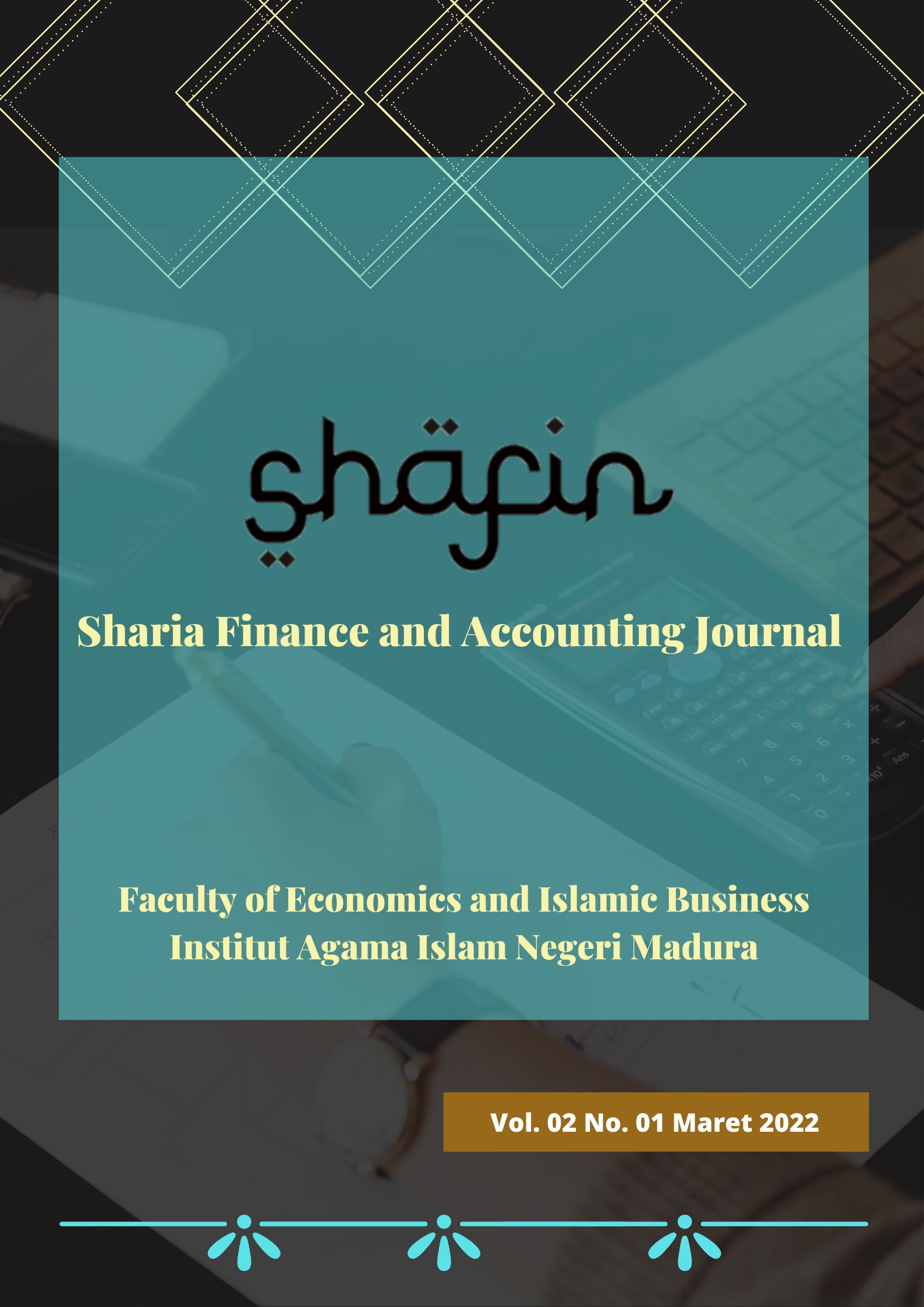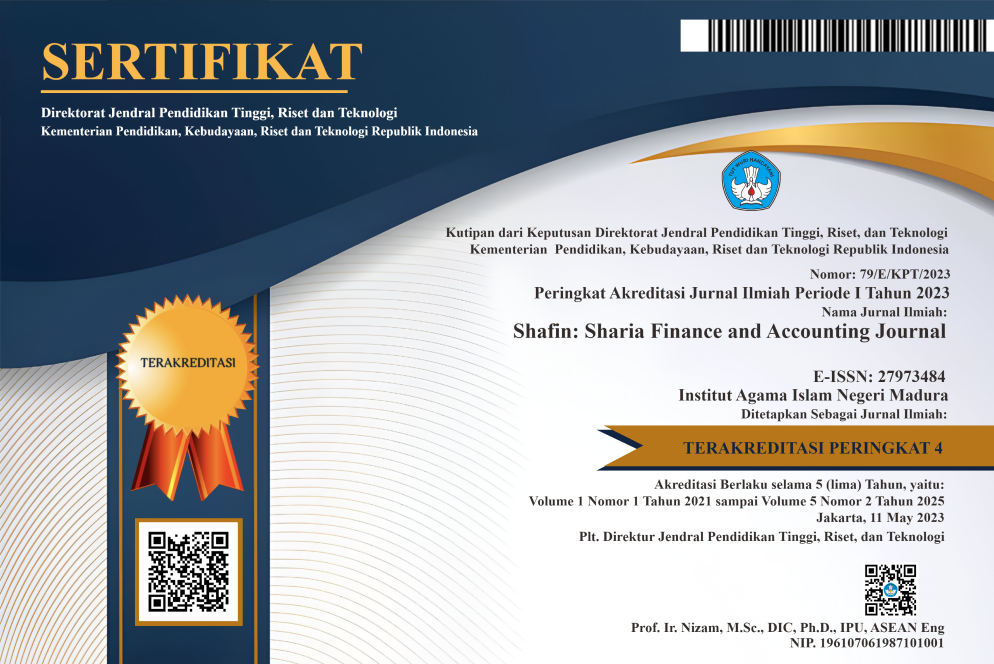Pandangan Islam terhadap Akuntansi Syariah
 Abstract views: 246
,
Abstract views: 246
,
 PDF (Bahasa Indonesia) downloads: 618
PDF (Bahasa Indonesia) downloads: 618
Abstract
This study aims to explain accounting thinking in a sharia perspective. This research is a library research, namely the study explains the concepts, theories and accounting principles in Islamic views. Data collection techniques are carried out by reading, reviewing and recording various literature or reading material that is in accordance with the subject. The results in this study are that the Shari'ah Accounting Paradigm is accounting that emphasizes the legal aspects and ethics of Islamic business. Shari'ah accounting leaned on the source of Islamic law, namely the Qur'an, Hadith, Fiqh (Qiyas, Ijtihad and IJMA). In the Islamic Shari'at Accountants, the presentation of its report is not just a means of determining the capital and measuring profits through the discharge of capital, but also presents a report that adheres to the rules contained in the Qur'an and Hadith, And can not violate forever, in other words reporting information according to the principles of Muamalah. A very important point to be introduced is that the application of shari'ah accounting based on the shari'ah paradigm is a part related to monotheism al-ibadah.
Downloads
References
Adnan, Akhyar, Akuntansi Syari'ah Arah, Prospek dan Tantangan, cet. I, Yogyakarta: UII Press, 2005
Arifin, Zainul, Dasar-dasar Manajemen Bank Syari'ah, edisi revisi, Jakarta: Pustaka Alvabet, 2006
Basyir, Ahmad Azhar, Asas-asas Hukum Mu’amalah (Hukum Perdata Islam),edisi revisi, Yogyakarta, UII Press, 2000
Harahap, Sofyan Syafri, Akuntansi Islam, cet. I, Jakarta: Bumi Aksara, 1997
Muhammad, Akuntansi Lembaga Keuangan Syari'ah: Panduan Praktis bagi Pengelola Bank Syari'ah dan BMT, Yogyakarta: STIS Yogyakarta, 1998
---------, Manajemen Bank Syari'ah, Edisi revisi, Yogyakarta: Unit Penerbit dan percetakan (UPP) AMP YKPN, 2005
----------, Pengantar Akuntansi Syari'ah, edisi I, Jakarta: Salemba Empat, 2002
----------, Prinsip-prinsip Akuntansi dalam Al-Qur'an, cet. II, Yogyakarta: UII Press, 2000
Mukaddimah, Jurnal Studi Islam, No. 17 th. X/2004
Rahman A, Ivan, Kamus Istilah Akuntansi Syari'ah, cet. I, Yogyakarta: Pilar Media, 2005
Rosjidi, Teori akuntansi: tujuan, Konsep, dan struktur, cet. I, (Jakarta: lembaga Penerbit FE UI, 1999 Rosjidi, Teori akuntansi: tujuan, Konsep, dan struktur, cet. I, Jakarta: lembaga Penerbit FE UI, 1999
Shibab, Umar, Kontekstualitas al-Qur'an : Kajian Tematik atas Ayat-ayat dalam al-Qur'an, (Ed). Hasan M. Noer, Jakarta: Paramadina, 2005
Shahata, Shauqi Ismail, Financial Accounting from The Islamic Point of View, Cairo : Alzahra al-A'lam al-A'rabi, 1985
Syahatah, Husein, Pokok-pokok Pikiran Akuntansi Islam, terj. Husnul Fatarib, cet. I, Jakarta: akbar Media Eka Sarana, 2001
Triyuwono, Iwan, Organisasi dan Akuntansi Syari'ah, cet. I, Yogyakarta: LkiS, 2000
Widodo, Hertanto dan Teten Kustiawati, Akuntansi dan Manajemen Keuangan untuk Organisasi Pengelola Zakat, cet. I, Jakarta: Institut Manajemen Zakat, 2001
The journal operates an Open Access policy under a Creative Commons Non-Commercial Share-Alike license. All articles published Open Access will be immediately and permanently free for everyone to read and download.
• Creative Commons Attribution-NonCommercial (CC-BY-NC)

Shafin: Finance and Sharia Accounting Journal by http://http://ejournal.iainmadura.ac.id/index.php/shafin is licensed under a Creative Commons Attribution-NonCommercial 4.0 International License.
Based on a work at http://ejournal.iainmadura.ac.id.















